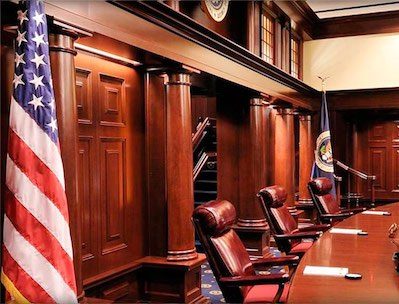“This ruling is not correct as a matter of contract interpretation, and overturns decades of unchallenged understanding and implementation of the University’s employment agreement and policy documents.”– Judge Pauline Newman dissent
 On August 2, the U.S. Court of Appeals for the Federal Circuit (CAFC) affirmed the U.S. District Court for the Northern District of California’s denial of Apple’s motion to dismiss in Omni MedSci, Inc. v. Apple, Inc. The majority, with Judge Linn writing, determined that the University of Michigan’s (UM’s) bylaws did not effectuate a present automatic assignment of patent rights from one of its faculty members. Judge Pauline Newman dissented.
On August 2, the U.S. Court of Appeals for the Federal Circuit (CAFC) affirmed the U.S. District Court for the Northern District of California’s denial of Apple’s motion to dismiss in Omni MedSci, Inc. v. Apple, Inc. The majority, with Judge Linn writing, determined that the University of Michigan’s (UM’s) bylaws did not effectuate a present automatic assignment of patent rights from one of its faculty members. Judge Pauline Newman dissented.
University of Michigan Bylaws
While working at UM, faculty member Dr. Islam signed an employment agreement that included a provision agreeing to abide by UM’s bylaws. UM Bylaw 3.10 specifically stipulates how intellectual property will be assigned to the university and its faculty, according to three conditions:
1) Patents, copyrights, and other property supported either directly or indirectly by university funds and all revenues “shall be the property of the university”
2) Patents, copyrights, and other property rights derived from activities which received no direct or indirect university support “shall be the property of the inventor”
3) Patents, copyrights, or other property supported both through university funds and independent activities “shall be owned as agreed upon in writing”
Dr. Islam took an unpaid leave-of-absence from UM in 2012 at which time he filed multiple provisional patent applications. Upon returning to UM in 2013, Dr. Islam filed non-provisional applications claiming priority to the provisional applications. When the patents issued, the rights were then assigned to Omni, Inc. (Omni). Neither UM nor Apple substantively disputed that the patents grew out of Dr. Islam’s time on leave, but argued that the patents were a product of university support. UM denied Dr. Islam’s request to confirm his ownership of the patents in 2013.
In 2018, Omni sued Apple in the Eastern District of Texas for infringement of U.S. Patent Nos. 9,651,533 and 9,861,286. Apple filed a motion to dismiss, arguing that Bylaw 3.10 automatically transferred legal title to the patents to UM. The Eastern District of Texas disagreed, finding that Bylaw 3.10 did not presently assign the patents and instead constituted a statement of future intention to assign. The case was then transferred to the Northern District of California, where the court found “no manifest error” in the Eastern District’s decision. Apple then appealed the dismissal to the CAFC.
Automatic Assignment or Obligation to Assign?
The CAFC reviewed the denial de novo and the underlying factual determinations for clear error. Patent assignment clauses, according to the CAFC, may either presently assign a future patent automatically or may simply promise to assign the patent in the future. The court cited Bd. Of Trustees of Leland Stanford Jr. Univ. v. Roche Mol. Sys., Inc. in finding that the type of assignment turns on the language of the contract. In most circumstances, inventors must expressly grant their rights to an employer for the employer to obtain those rights and “the general rule is that rights in an invention belong to the inventor.” 563 U.S. 776, 786 (2011). In the present case, the CAFC concluded that paragraph 1 of Bylaw 3.10 does not unambiguously constitute either a present automatic assignment or a promise to assign in the future and is instead best read as a “statement of intended disposition and a promise of a potential future assignment . . .”
The CAFC first looked to the language of paragraph 1 and 4 of Bylaw 3.10 (“shall be the property of”), finding that each merely stipulates the conditions governing the assignment of rights, and read as a statement of intended outcome as opposed to a present assignment of rights. The CAFC also reviewed the language of paragraph 5 which uses the phrase “shall be owned as agreed upon in writing[.]” The CAFC found that this language calls for a future determination of ownership after a negotiation between UM and the inventor. Thus, the language of paragraphs 1, 4, and 5 cannot be read to confer a present automatic assignment.
Next, the CAFC examined the language of the contract for evidence of present tense verbs of execution. It looked to its decision in Arachnid, Inc. v. Merit Industries, Inc., where the contract stated that inventions conceived “in the course of the project covered by this agreement shall be the property of [Arachnid], and all rights thereto will be assigned by IDEA . . . to [Arachnid].” 939 F.2d at 1576. The CAFC interpreted the provision to be “an agreement to assign, not an assignment” and accordingly found no distinction in the present case. Apple argued that Arachnid is distinguishable because the present language lacks the “will be assigned to” language in Arachnid’s holding. The CAFC disagreed, however, finding that the word “will” in Arachnid was used as a statement of intention just like “shall” is used in the present case, and thus lacks a present-tense active verb needed to convey automatic ownership.
Conflicting Reports and Bylaws
In addition to the above language analysis, the CAFC found that paragraph 1 of Bylaw 3.10 conflicts with the language used by UM’s Office of Technology Transfer in its Invention Report. The report notes that the form indicates assignment is “required” rather than previously executed under Bylaw 3.10, using clear language of present automatic assignment. The CAFC disagreed with Apple’s contention that this language was simply confirming the prior assignment of Bylaw 3.10, finding that the language of the report is “distinct unambiguous language of present assignment,” and therefore it is a further act required to effectuate the assignment.
Apple’s Further Arguments Fail
The CAFC did not find any of Apple’s other arguments convincing. Apple argued that the language of paragraph 1 of Bylaw 3.10 is like language categorized by the Supreme Court as “unambiguously automatically vesting title.” The CAFC disagreed, finding in Roche the inventions created in accordance with federal statutes were exceptions that only concerned government contracts, not contracts between private parties. Furthermore, the CAFC found that “nothing in Roche should be taken as a holding that the word ‘shall’ implies any sort of transfer, immediate or otherwise” because it merely recognizes that title to patents relating to specific inventions vests in the United States. Apple also argued that two prior CAFC cases interpreted “shall” as effectuating a present automatic transfer of rights. The CAFC disagreed with Apple here as well. According to the CAFC, the decision in Heinemann v. United States is “a far cry from the straightforward interpretation of language in a contract between two private parties” and did not concern the nature of the government’s patent ownership. 796 F.2d 451, 456 (Fed. Cir. 1986). Apple additionally cited Lone Star Silicon Innovations v. Nanya Technology, arguing that whether an agreement confers an assignment or a mere license “depends on the substance of what was granted rather than formalities or magic words.” 925 F.3d at 1229. Though the CAFC noted that Apple’s point was well taken, it still found that without the presence of “active verbal expression of present execution[,]” there is no substantive indication of an intended automatic assignment.
Lastly, Apple argued that the Bylaw 3.10 section “Granting Rights Back to Inventors” confirms that the bylaws are meant to effectuate a present automatic transfer, because it sets forth conditions in which the university may license its rights back to inventors. However, the CAFC agreed with Omni that this does nothing to explain how the rights are obtained by the university at the outset, because the “retain” language does not address how the university “obtains” the rights it purportedly retains. Finally, the CAFC did not find the parties’ past conduct to change the interpretation of the language of the Bylaws.
Newman Dissent
Judge Pauline Newman dissented, arguing that the patents at issue are property of the university, so Omni does not have standing to sue.
Newman argued that “shall be the property of the University[,]” when read in accordance with its express terms and plain meaning thereof, is that inventions made during employment and patents acquired from such shall belong to UM. Where the majority finds the use of the phrase “shall be” instead of “is” to be a fatal flaw, Newman argues that “shall be” is the only appropriate phrase for assignment because the documents necessarily apply only to future inventions. Citing Alaska Lumber & Pulp Co. v. Madigan, she noted that when contract provisions are clear and unambiguous, they must be given their plain and ordinary meaning. 2 F.3d 389, 392 (Fed. Cir. 1993). Due to the long-established understanding between UM and faculty members that “shall be the property of the University” intentionally vests ownership in UM when intellectual property comes into being, there is no other plain and ordinary meaning to consider, according to Newman. Thus, it cannot reasonably be concluded that the parties intended that Professor Islam would nonetheless own inventions made with university support. She wrote:
This ruling is not correct as a matter of contract interpretation, and overturns decades of unchallenged understanding and implementation of the University’s employment agreement and policy documents. . . . From the court’s contrary ruling, I respectfully dissent.

![[IPWatchdog Logo]](https://ipwatchdog.com/wp-content/themes/IPWatchdog%20-%202023/assets/images/temp/logo-small@2x.png)

![[[Advertisement]]](https://ipwatchdog.com/wp-content/uploads/2023/01/2021-Patent-Practice-on-Demand-1.png)
![[Advertisement]](https://ipwatchdog.com/wp-content/uploads/2024/04/Artificial-Intelligence-2024-REPLAY-sidebar-700x500-corrected.jpg)
![[Advertisement]](https://ipwatchdog.com/wp-content/uploads/2024/04/UnitedLex-May-2-2024-sidebar-700x500-1.jpg)
![[Advertisement]](https://ipwatchdog.com/wp-content/uploads/2024/04/Patent-Litigation-Masters-2024-sidebar-700x500-1.jpg)

![[Advertisement]](https://ipwatchdog.com/wp-content/uploads/2021/12/WEBINAR-336-x-280-px.png)
![[Advertisement]](https://ipwatchdog.com/wp-content/uploads/2021/12/2021-Patent-Practice-on-Demand-recorded-Feb-2021-336-x-280.jpg)
![[Advertisement]](https://ipwatchdog.com/wp-content/uploads/2021/12/Ad-4-The-Invent-Patent-System™.png)






Join the Discussion
One comment so far.
allison
August 11, 2021 10:14 amBut U of M has a breach of contract argument/claim if it wanted to pursue it, right? Or did I miss something?